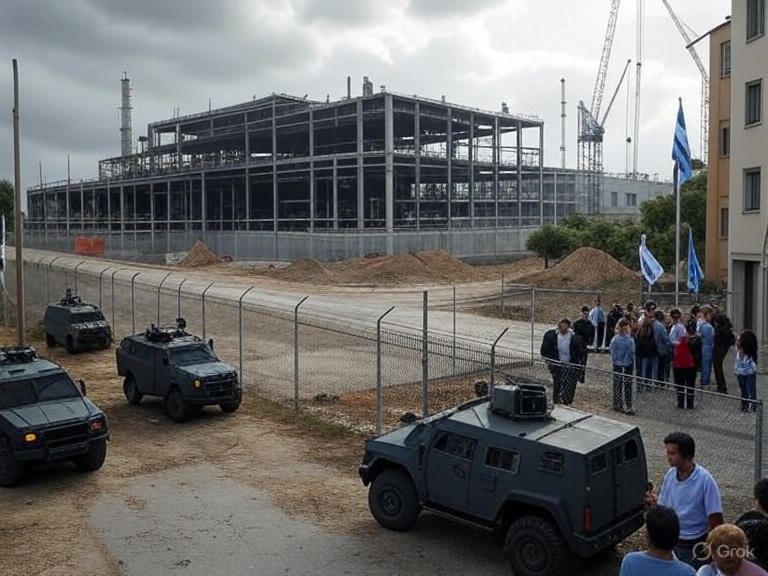In the realm of international defense deals, partnerships between nations often promise economic boosts, technological advancements, and strategic alliances. However, the 2021 acquisition of Greece’s Hellenic Vehicle Industry (ELVO) by an Israeli-led consortium has sparked ongoing debates about whether these commitments have been met. At the center of the controversy is SK Group, an Israeli defense and technology holding company, which recently consolidated full ownership of ELVO in August 2025. While SK Group touts the move as a milestone for growth and innovation, critics point to a track record of stalled investments and limited operational progress, raising questions about the consortium’s adherence to the original deal terms.
The Original Deal: High Hopes and Substantial Commitments
ELVO, a state-owned Greek manufacturer specializing in military and civilian vehicles, has long been a key player in Greece’s defense sector. Facing financial pressures, the Greek government launched a privatization tender in 2019, culminating in the sale of a 90% stake to an Israeli consortium comprising Plasan Sasa Ltd (47.6%), Naska Industries – SK Group (47.6%), and Greek businessman Aristidis Glinis (4.8%) for a modest €3 million. The deal, finalized on February 14, 2021, included ambitious pledges to revitalize the company.
Central to the agreement was a commitment to invest between €95 million and €135 million over five years, contingent on securing orders. This funding was earmarked for expanding production capabilities, particularly in armored vehicles, and positioning ELVO as a hub for both domestic needs and European exports. Proponents hailed it as a strategic win, enhancing Greco-Israeli ties amid warming diplomatic relations. The consortium emphasized local job creation, innovation in defense technology, and integration into global supply chains.
Stagnation and Signs of Trouble (2021–2023)
Despite the optimistic blueprint, progress appeared sluggish from the outset. By early 2023, market sources reported that ELVO’s activities had been minimal, largely confined to maintenance work on a few dozen excavators rather than the promised ramp-up in military vehicle production. The €100 million investment plan—intended to fund new manufacturing lines and R&D—had reportedly not commenced, leaving the company in a state of limbo.
This lack of advancement prompted internal shifts within the consortium. In April 2023, Plasan Sasa, one of the major stakeholders, agreed in principle to sell its shares to a European consortium led by a German firm linked to France’s Nexter Systems. Similarly, SK Group received and evaluated a proposal for its stake. The motivation? The buyout offers were described as “many times higher” than the initial capital outlay, suggesting that the partners saw an opportunity to exit profitably amid underwhelming performance. Critics argued this reflected a failure to deliver on the investment obligations, as ELVO’s output and economic impact fell short of expectations.
Greek media and industry observers attributed the delays to several factors, including challenges in securing contracts from the Hellenic Armed Forces and broader economic uncertainties. However, the absence of tangible investments raised eyebrows, especially given the deal’s conditional nature tied to order volumes. No official audits or public disclosures confirmed the exact amount invested during this period, but the company’s dormant state suggested that the pledged funds had not materialized as planned.
Full Takeover in 2025: A Fresh Start or Continued Concerns?
Fast-forward to August 2025, and SK Group announced its acquisition of the remaining shares, becoming the sole owner of ELVO. The move was framed as a “significant milestone” in SK Group’s European expansion, with promises to transform ELVO into a “premier production and export hub.” SK Group’s Vice Chairman, Ronen Hamudot, emphasized the company’s “long-term commitment to Greece,” highlighting plans to bolster local industry, advance innovation, and fuel economic growth through advanced land defense capabilities.
Yet, this development has not quelled skepticism. Left-wing opposition parties in Greece, such as the New Left, have vehemently denounced the sale, labeling it a “scandal” and expressing concerns over foreign control of a strategic national asset. They argue that handing full ownership to SK Group—whose portfolio includes Israel Weapon Industries (IWI), a major arms manufacturer—could compromise Greece’s sovereignty and align it too closely with Israeli interests amid regional tensions.
Moreover, the timing raises questions: With the five-year investment window from 2021 nearing its end, has SK Group retroactively fulfilled its obligations? Recent reports do not detail past expenditures, focusing instead on future intentions. If the earlier stagnation is any indicator, the consortium’s partial exit and SK Group’s consolidation might signal a pivot rather than a continuation of unmet promises. Economic analysts suggest that without transparent reporting, it’s challenging to assess compliance, but the lack of major projects or revenue growth at ELVO since 2021 points to underperformance.
Broader Implications for Greco-Israeli Relations and Defense Privatization
This saga underscores the pitfalls of cross-border defense privatizations, where geopolitical alliances intersect with economic realities. For Greece, ELVO’s revitalization is crucial for modernizing its military fleet and stimulating employment in Thessaloniki, where the company is based. SK Group’s expertise in small arms, armored solutions, and logistics could indeed deliver if investments flow as pledged now.
On the flip side, the episode highlights risks when commitments are tied to uncertain orders. Opposition voices call for stricter oversight in future deals to ensure foreign investors deliver on promises, rather than treating national assets as short-term flips. As one Greek commentator noted, “Privatization should build industries, not just change owners.”
SK Group maintains that its full ownership will unlock ELVO’s potential, deepening ties with Greece and positioning the company for global exports. Whether this marks a genuine turnaround or perpetuates past shortcomings remains to be seen. As the dust settles on this latest chapter, stakeholders will watch closely to see if actions match the rhetoric.
In conclusion, while SK Group’s recent moves signal renewed intent, the historical lag in investments and operational progress suggests the original deal has not been lived up to in full. Transparency from both the company and Greek authorities will be key to restoring confidence in this strategic partnership.
